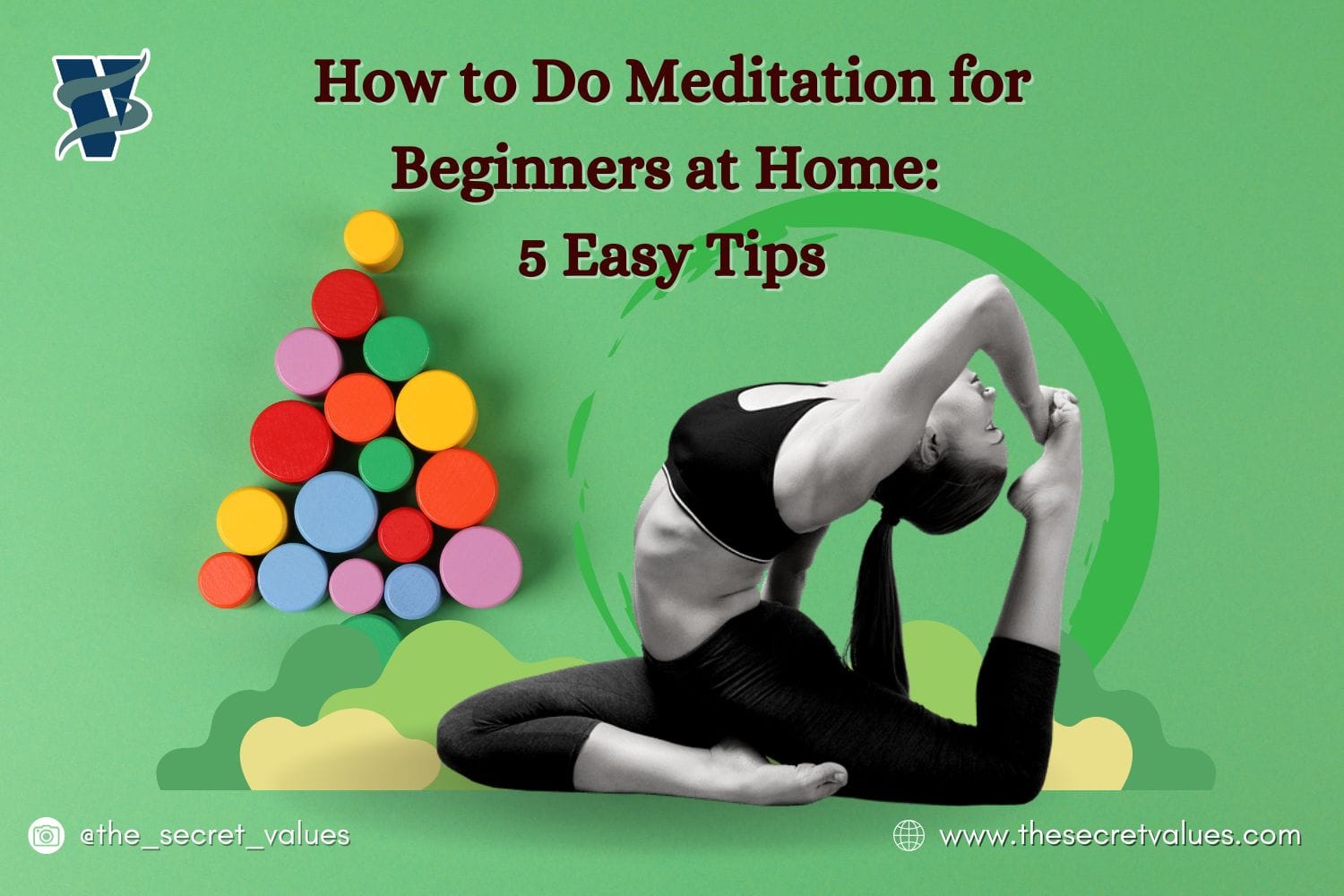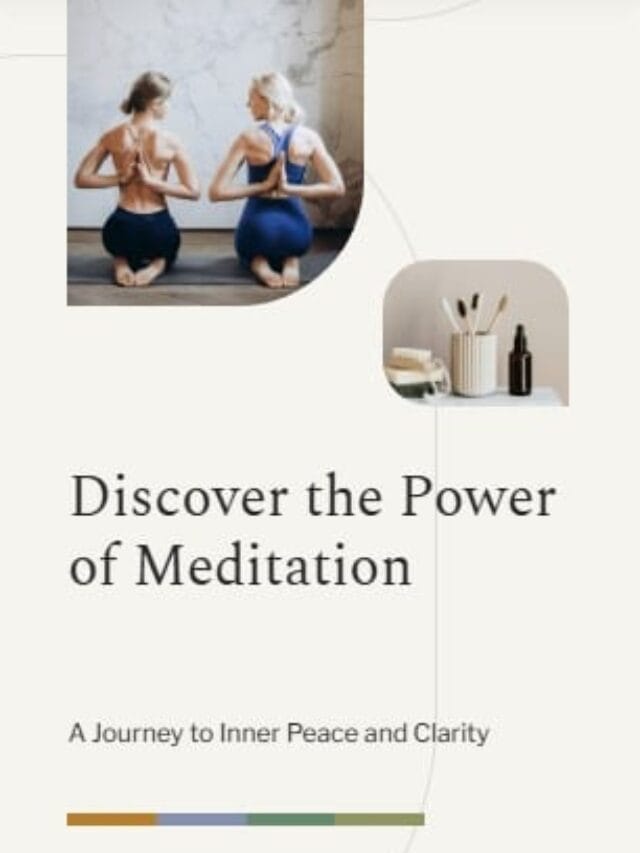Anyone can benefit from the age-old practice of meditation, especially those new to it. How to do meditation for beginners at home is a common question many people have, and it’s great that you’re considering it. It is an excellent way to relieve stress and improve overall health, but meditating at home can be incredibly convenient, private, and calming. If you’ve ever wondered how to meditate at home, you’re in the right place. In this guide, we’ll explore how to do meditation for beginners at home with five simple tips to get you started on your journey.
Introduction: Why Meditation at Home is Perfect for Beginners
For good reason, meditation is trendy. It is best used to decrease muscle tension, enhance mental clarity and create greater inner calm. The home can also be a less intimidating place to start than a class or studio if you’ve never meditated. You’re familiar and comfortable with the space, so you can work freely without distractions or anxiety.
Understanding the Benefits of Meditation for Beginners
When you first start meditating, it may not feel very clear. However, the benefits you’ll experience, such as reduced anxiety, increased focus, and improved sleep, are well worth the effort. You don’t need to be a spiritual guru to reap these rewards—anyone can do it!
Why Home is the Ideal Place to Start Meditation
Meditating at home gives you complete control. You can decide the time, space, and environment that make you feel most comfortable. Plus, you can practice as often as possible without worrying about class schedules or fees. Home is your perfect sanctuary to begin.
What You Need to Know Before You Begin
Before you start your first meditation session, let’s discuss what to expect and how to set yourself up for success.
The Basics of Meditation: What to Expect
Meditation isn’t about emptying your mind; it’s about being present and aware of your thoughts without judgment. As a beginner, it’s natural for your mind to wander. Don’t worry—this is normal. The goal is to refocus your attention on your breath or mantra.
Setting Realistic Goals for Your Meditation Journey
Don’t expect success immediately; plan small, achievable objectives to lead you into the practice. A good starting point is five minutes of daily meditation for the first week. As you become familiar with the practice, push the limit and try other meditation techniques.
How to Do Meditation for Beginners at Home: A Step-by-Step Guide
Ready to dive in? Here’s a simple, step-by-step guide for home meditation beginners.
Preparing Your Space for Meditation
It should be a peaceful space where you won’t get disturbed. It could be a corner in your living room or inside your room. It’s also wise to make it cosy by putting a cushion or a blanket on it. The more inviting your space, the more likely you’ll want to return.
Choosing the Right Time for Meditation
Consistency is key. Choose a time that works for you, whether early in the morning, during your lunch break, or before bed. Meditating at the same time every day can help form a habit.
5 Easy Tips for How to Meditate at Home
Here are five easy tips for starting a solid meditation practice at home.
Tip 1: Find a Quiet and pleasant Space
Create a space where you feel calm and relaxed. Dim the lights and minimise any noise, if possible. This will help you get into the right mindset for meditation.
Tip 2: Practice Regularly for Best Results
Like any skill, meditation gets better with practice. Set aside time every day, even if it’s just for a few minutes, to make it a habit. Consistency is key to harvesting the full advantages of meditation.
Tip 3: Start with Short Sessions
As a beginner, it’s easy to get overwhelmed if you try to meditate for too long. Start with 5-10 minutes, and gradually extend as you get more comfortable.
Tip 4: Use Guided Meditation Apps
Some apps guide meditation. Those can really keep you focused, at least initially. There are also calming voices and instructions that might make meditation more accessible.
Tip 5: Focus on Your Breathing
One of the beginner’s most effective meditation techniques is focusing on their breath. After taking a big breath through their nose, they exhale through their mouth. This simple action can help centre their thoughts.
Common Mistakes Beginners Make When Meditating at Home
Everyone makes mistakes when they first start, and meditation is no exception. Let’s talk about a couple of common pitfalls beginners often encounter.
Overthinking the Process
Many beginners think they need to meditate perfectly right away. But meditation is about progress, not perfection. Don’t worry if your mind wanders—gently bring your attention back.
Expecting Instant Results
Meditation isn’t a quick-fix solution. It takes time to feel the benefits, so be patient with yourself. Over time, you’ll notice improvements in your mental and physical well-being.
The Role of Consistency in Meditation Success
Consistency is the key to successful meditation. It’s not about doing it for an hour one day and skipping the subsequent—small, regular sessions add up.
How Consistency Enhances Your Meditation Practice
Sticking to a routine trains your mind to be more focused and present. Regular implementation allows you to develop a deeper connection with your inner self.
Tracking Your Progress for Motivation
Consider keeping a meditation journal. Write down how you felt before and after each session. This will enable you to keep track of your progress and stay motivated.
Incorporating Meditation into Your Daily Life
Meditation should be more than just a hobby—it should become part of your lifestyle.
Making Meditation Part of Your Daily Routine
Meditating at the same time every day can help you form a habit. Consistency is the key to success, whether before you start your day or before bed.
Tips for Staying Committed to Your Practice
Start small and work your way up. The more you meditate, the easier it is. Try to set small goals for yourself, like meditation every day for a week, and celebrate when you complete them.
How to Meditate at Home Without Distractions
Distractions can be a considerable challenge when meditating at home. But with a few simple strategies, you can overcome them.
Managing External Distractions
Turn off your phone notifications, close doors, and let family or roommates know you need quiet time. Minimising distractions will help you stay focused.
Creating a Meditation Routine
A set routine can help you prepare for meditation. Try incorporating pre-meditation rituals, like drinking tea or listening to soft music, to signal that it’s time to meditate.
Conclusion: Enjoy the Benefits of Meditation at Home
Doing meditation for beginners at home doesn’t need to be complicated. By following these simple points, you can begin your meditation journey today. Remember, the most important thing is to be patient and consistent. With time, you’ll experience the numerous benefits of meditation, including stress relief, improved concentration, and mental clarity.
FAQs
How long should I meditate as a beginner?
Increase the duration progressively as you become comfortable, starting with 5 to 10 minutes.
Can meditation help reduce stress?
Yes, meditation is known for its stress-reducing benefits by strengthening emotional control and promoting mental calmness.
Do I need to follow a particular meditation technique at home?
Not necessarily. You can experiment with different techniques and choose the one that feels best for you.
Can I meditate at home without any special tools?
Absolutely! You can meditate anywhere you find a quiet space and a comfortable seat. You don’t need candles or cushions to sit on, but they might enhance the experience.
How do I stay focused during meditation at home?
Use a guided meditation or pay attention to your breathing to help you stay focused. It’s normal for your mind to wander—gently bring it back to your breath.









Hello, I will recommend your website to all my friends and family.
Your writing is so relatable and down-to-earth It’s like chatting with a good friend over a cup of coffee Keep sharing your wisdom with us
I’m often to blogging and i really appreciate your content. The article has actually peaks my interest. I’m going to bookmark your web site and maintain checking for brand spanking new information.
One of the best reads I’ve had this week.